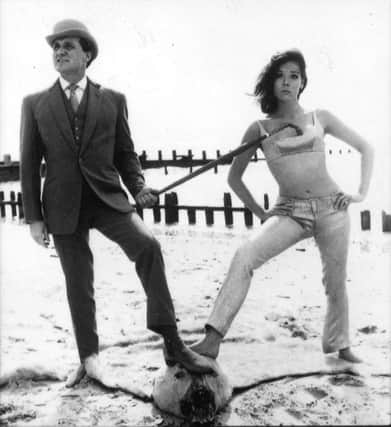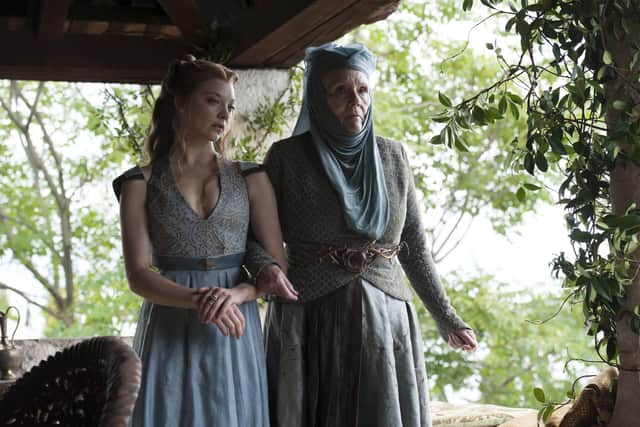Obituary: Dame Diana Rigg, actress


Dame Diana Rigg, who has died at 82, shot to fame as Emma Peel in the 1960s TV series The Avengers and then as the only Bond girl to walk 007 up the aisle.
But she was also acclaimed for her many Shakespearean roles and for her more recent appearances as the powerful matriarch Olenna Tyrell in Game Of Thrones.
Advertisement
Hide AdAdvertisement
Hide AdEnid Diana Elizabeth Rigg was born in Doncaster, the daughter of a railway worker whose job took the family to India when Diana was two months old.


She spoke Hindi as a second language, and when the Riggs returned to Yorkshire and she was boarded at the Moravian school at Fulneck, Pudsey, she felt like a fish out of water.
She trained at the Royal Academy of Dramatic Art and made her professional debut in a production of Brecht’s The Caucasian Chalk Circle at the 1957 York Festival, before joining the Royal Shakespeare Company. At Stratford from 1959, she quickly established herself with important roles in productions of The Taming Of The Shrew, A Midsummer Night’s Dream, Macbeth and King Lear.
After that, The Avengers, in which she succeeded Honor Blackman as Patrick Macnee’s co-star, made her a transatlantic star – but she was unhappy about the intrusion into privacy that came with being on TV, and was also critical of the way she was treated by her bosses.
Advertisement
Hide AdAdvertisement
Hide AdShe also discovered that she was being paid less than a cameraman.
“It was very, very intrusive in those days, because I was instantly recognisable,” the actress later said.
“I was grateful to be a success, but there was a price to pay.”
In 1969, she co-starred in On Her Majesty’s Secret Service, opposite the one-time Bond actor George Lazenby, with whom she had a difficult relationship.
Advertisement
Hide AdAdvertisement
Hide AdIt was in the 1970s that she joined the National Theatre, where she played major roles in Tom Stoppard’s Jumpers, The Misanthrope, Pygmalion, Antony And Cleopatra and Stephen Sondheim’s Follies.
In a nude scene she played in Abelard And Heloise, she was described by one critic as being “built like a brick mausoleum with insufficient flying buttresses”.
As a result, she produced a book of the worst-ever theatrical reviews, entitled No Turn Unstoned. It was a best-seller.
Her many film credits included The Hospital, A Midsummer Night’s Dream, A Little Night Music, Evil Under The Sun and A Good Man In Africa.
Advertisement
Hide AdAdvertisement
Hide AdIn 1994, she won a Tony Award for her Broadway performance in the title role of the Greek tragedy, Medea. And in 2008, as she approached 70, she was appearing in The Cherry Orchard at the Chichester Festival Theatre.
Her many TV credits included roles in Hedda Gabler, Witness For The Prosecution, Bleak House and Mother Love. It was for her superb portrayal in that BBC production of an obsessive mother who was prepared to do anything, even commit murder, to keep control of her son which won her the 1989 Bafta for best actress.
Dame Diana was married to the Israeli painter Menachem Gueffen from 1973 to 1976, and was later married to Archibald Stirling, a theatrical producer and former officer in the Scots Guards. She had a daughter by Stirling, the actress Rachael Stirling.
She also played the Duchess of Buccleuch in ITV royal drama Victoria, the young queen’s mistress of the robes, who is “renowned for speaking her mind”.
Advertisement
Hide AdAdvertisement
Hide AdLast year, she revealed that she had suffered an unwelcome sexual advance early in her career at the hands of a “powerful” film director. She welcomed the emergence of the “Me, Too” movement as a means for women to speak out, she said.
Comment Guidelines
National World encourages reader discussion on our stories. User feedback, insights and back-and-forth exchanges add a rich layer of context to reporting. Please review our Community Guidelines before commenting.